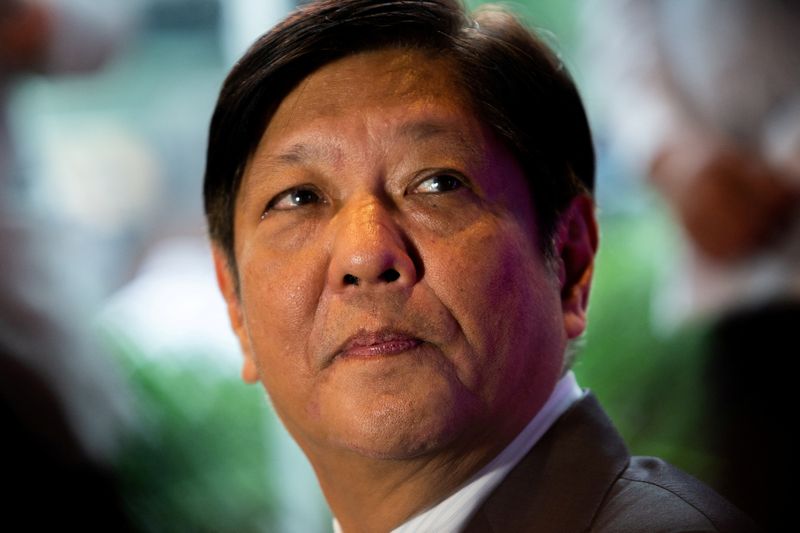Philippines begins new era of Marcos rule, decades after overthrow
2022.06.30 08:10
3/3

FILE PHOTO: Philippine president-elect Ferdinand “Bongbong” Marcos Jr., son of late dictator Ferdinand Marcos, is photographed during a news conference at his headquarters in Mandaluyong City, Metro Manila, Philippines, May 23, 2022. REUTERS/Lisa Marie Da
2/3
By Karen Lema and Neil Jerome Morales
MANILA (Reuters) -The son and namesake of late dictator Ferdinand Marcos was sworn in as president of the Philippines on Thursday, completing a stunning comeback for one of Asia’s most famous political dynasties, 36 years after it was ousted in a popular uprising.
Marcos Jr scored a rare landslide victory in last month’s election, helped by what his critics see as a decades-long effort to alter public perceptions of a family that lived lavishly at the helm of one of the world’s most notorious kleptocracies.
In a speech that echoed his campaign slogans of unity, Marcos Jr, better known as “Bongbong”, vowed to take the country far on his watch with policies benefiting everyone, and thanked the public for delivering what he called “the biggest electoral mandate in the history of Philippine democracy”.
“You will not be disappointed, so do not be afraid,” he said at his inauguration ceremony, surrounded by his immediate family and with his sister Imee, a senator, and 92-year-old mother Imelda, a former four-time congresswoman, seated close by.
Marcos Jr, 64, also praised his late father’s rule, but said his presidency was not about the past, but a better future.
“I once knew a man who saw what little had been achieved since independence ….but he got it done sometimes with the needed support, sometimes without,” he said.
“So will it be with his son. You will get no excuses from me.” He added: “No looking back in anger or nostalgia.”
The elder Ferdinand Marcos ruled the Philippines from 1965 for two decades, almost half of it under martial law, helping him to extend his grip on power until his overthrow and his family’s retreat into exile during a 1986 “people power” revolution.
Thousands of Marcos opponents were jailed, killed or disappeared during his rule, and the family name became synonymous with cronyism, extravagance and the disappearance of billions of dollars from state coffers. The Marcos family has rejected accusations of embezzlement.
Hundreds of activists were expected to protest against the inauguration of Marcos Jr, angered by a campaign buoyed by a powerful network of supporters and social media influencers determined to debunk historical narratives of the Marcos era.
The former senator and congressman campaigned on the slogan “together, we shall rise again”, invoking nostalgia for his father’s rule, which his family and supporters have portrayed as a golden age for the Philippines, a former U.S. colony.
Voters are counting on him to deliver on pledges to create jobs and bring down consumer prices in a country of 110 million people, nearly a quarter of whom live on less than $2 per day.
In a stirring 30-minute speech, Marcos Jr pledged education reforms, to improve food sufficiency, infrastructure, waste management and energy supply and to give full support for millions of overseas Filipino workers.
“I fully understand the gravity of the responsibility you put on my shoulders. I do not take it lightly but I am ready for the task,” he said.
“I will get it done.”








